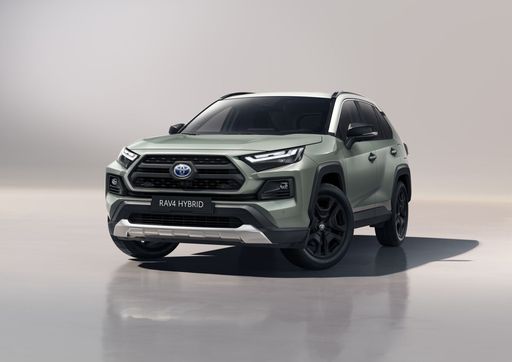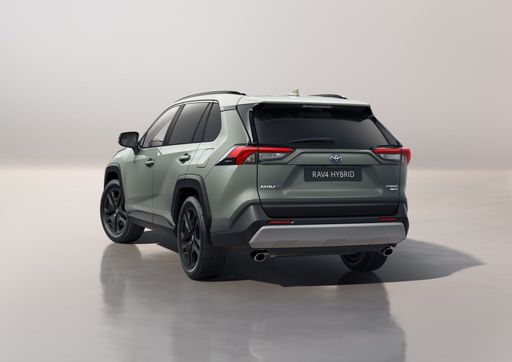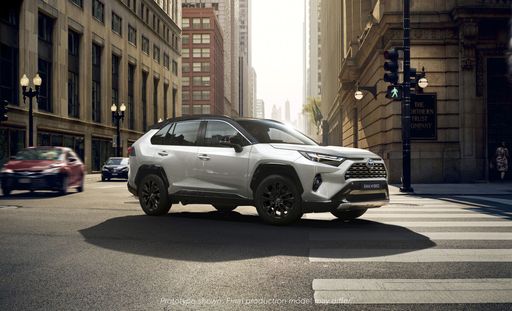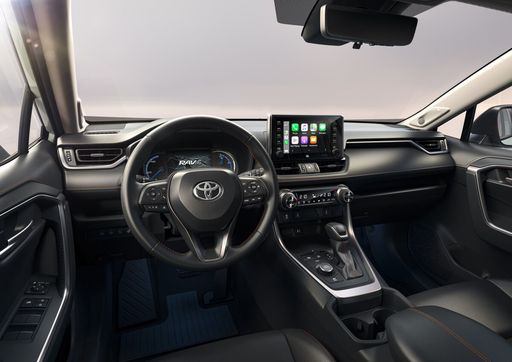Toyota C-HR vs Toyota RAV4 – Differences & prices compared
Compare performance, boot space, consumption and price in one view.
Find out now: which car is the better choice for you – Toyota C-HR or Toyota RAV4?
The Toyota C-HR (SUV) comes with a Full Hybrid or Plugin Hybrid engine and Automatic transmission. In comparison, the Toyota RAV4 (SUV) features a Full Hybrid or Plugin Hybrid engine with Automatic transmission.
When it comes to boot capacity, the Toyota C-HR offers 447 L, while the Toyota RAV4 provides 580 L – depending on how much space you need. If you’re looking for more power, decide whether the 223 HP of the Toyota C-HR or the 306 HP of the Toyota RAV4 suits your needs better.
In terms of consumption, the values are 0.80 L per 100 km for the Toyota C-HR, and 1 L for the Toyota RAV4.
Price-wise, the Toyota C-HR starts at 29100 £, while the Toyota RAV4 is available from 35100 £. Compare all the details and find out which model fits your lifestyle best!
In the battle of compact SUVs, the Toyota C-HR and Toyota RAV4 each cater to distinct preferences and needs. While the C-HR impresses with its bold design and nimble handling, making it ideal for urban environments, the RAV4 offers more space, versatility, and robust off-road capabilities. Ultimately, the choice between these two popular models hinges on whether you prioritize style and agility over practicality and power.
Toyota C-HR
The Toyota C-HR stands out with its distinctive and bold design that combines sleek, angular lines with a sporty posture. Its comfortable and stylish interior is equipped with advanced technology features, providing a seamless driving experience. The vehicle offers impressive handling and performance, making it a compelling choice for those who appreciate a blend of practicality and flair on the road.
details @ Toyota
@ Toyota
 @ Toyota
@ Toyota
 @ Toyota
@ Toyota
 @ Toyota
@ Toyota
 @ Toyota
@ Toyota
Toyota RAV4
The Toyota RAV4 stands out in the crowded SUV market with its distinct design, embodying a blend of robustness and style. Its cabin provides a harmonious fusion of comfort and practicality, offering plenty of space for both passengers and luggage. This vehicle is engineered to deliver a smooth driving experience, whether manoeuvring through city streets or exploring winding country roads.
details @ Toyota
@ Toyota
 @ Toyota
@ Toyota
 @ Toyota
@ Toyota
 @ Toyota
@ Toyota
Introduction: The Ultimate Compact SUV Showdown
The automotive market is inundated with compact SUVs, but two stand out for their blend of innovation, performance, and reliability: the Toyota C-HR and the Toyota RAV4. Both models carry the Toyota badge with pride, yet they appeal to different types of consumers. In this article, we delve into a comprehensive comparison of these two SUVs, focusing on their technical aspects, performance metrics, and notable innovations.
Design and Dimensions
The Toyota C-HR exudes a sporty demeanor with its striking coupe-like silhouette, measuring 4362 mm in length, 1832 mm in width, and standing at 1558 mm high. In contrast, the Toyota RAV4 presents a more robust and traditional SUV stance, stretching 4600 mm long and measuring 1855 mm wide, topped at 1685 mm. Both vehicles feature a five-door configuration and comfortably seat five passengers, yet the RAV4 offers more interior space - a factor worth considering for those with family or cargo needs.
Powertrains and Performance: Under the Hood
When it comes to engine options, the C-HR is offered as a Full Hybrid or Plugin Hybrid, with power outputs of 140 HP and up to 223 HP respectively, delivering impressive power while maintaining efficiency. The engine capacities range from 1798 to 1987 cm³, and the vehicle accelerates from 0-100 km/h in as little as 7.4 seconds, depending on the variant. Fuel consumption rates are commendable, with values as low as 4.7 L/100 km.
On the other hand, the RAV4 also showcases a Full Hybrid and Plugin Hybrid lineup, boasting power outputs from 218 HP up to 306 HP. The RAV4’s robust 2487 cm³ engine ensures spirited performance with a 0-100 km/h time of just 6 seconds in its most potent form. Although it has a higher fuel consumption rate of 5.6 L/100 km, its larger engine provides a balance of efficiency and raw power, catering to those who desire a more dynamic driving experience.
Innovative Technologies
Both the C-HR and RAV4 are equipped with Toyota's latest technology, including advanced safety features under the Toyota Safety Sense umbrella. This suite offers adaptive cruise control, lane-keeping assistance, and pre-collision systems to ensure driver and passenger safety.
The C-HR emphasizes urban practicality with features such as a uniquely designed infotainment system that integrates seamlessly with smartphones. Conversely, the RAV4 boasts a more spacious layout with an expansive multimedia system and upgraded connectivity options, making it ideal for family road trips.
Efficiency and Emissions
Efficiency is a crucial consideration for modern consumers, and both vehicles perform admirably in this area. The C-HR achieves remarkable CO2 emissions, with values between 105-108 g/km, positioning it in the B and C efficiency classes. Its electric range reaches up to 67 km, making it a suitable option for daily commutes.
The larger RAV4, while slightly less efficient with CO2 emissions ranging from 126-128 g/km and an electric range of 75 km, benefits from its fuel tank capacity of 55 liters. The RAV4's ability to cover longer distances with fewer stops is a significant advantage for adventure-seekers or those who frequently travel.
Practicality and Cargo Space
When it comes to cargo capacity, the RAV4 reigns supreme, offering between 520 to 580 liters of trunk space, accommodating larger items and making it family-friendly. In comparison, the C-HR, with its more compact design, provides a trunk capacity of 350 to 447 liters, ideal for city dwellers with smaller storage needs.
Conclusion: The Right Choice for You
The Toyota C-HR is a fantastic choice for urban drivers seeking a compact, stylish option with impressive fuel efficiency and innovative technology. However, if you require more space, power, and versatility for family outings or adventurous weekends, the Toyota RAV4 emerges as the frontrunner.
Ultimately, both SUVs reflect Toyota’s commitment to quality and innovation. Choosing between them will depend on your lifestyle, preferences, and specific needs. Regardless of the decision, both models promise a blend of reliability and performance, embodying Toyota’s legacy as a leader in the automotive industry.

|

|
|
|
|
Costs and Consumption |
|
|---|---|
|
Price
29100 - 42800 £
|
Price
35100 - 55700 £
|
|
Consumption L/100km
0.8 - 5.1 L
|
Consumption L/100km
1 - 5.6 L
|
|
Consumption kWh/100km
-
|
Consumption kWh/100km
-
|
|
Electric Range
68 km
|
Electric Range
75 km
|
|
Battery Capacity
-
|
Battery Capacity
-
|
|
co2
17 - 115 g/km
|
co2
22 - 128 g/km
|
|
Fuel tank capacity
43 L
|
Fuel tank capacity
55 L
|
Dimensions and Body |
|
|---|---|
|
Body Type
SUV
|
Body Type
SUV
|
|
Seats
5
|
Seats
5
|
|
Doors
5
|
Doors
5
|
|
Curb weight
1505 - 1755 kg
|
Curb weight
1745 - 1910 kg
|
|
Trunk capacity
350 - 447 L
|
Trunk capacity
520 - 580 L
|
|
Length
4362 mm
|
Length
4600 mm
|
|
Width
1832 mm
|
Width
1855 mm
|
|
Height
1558 - 1564 mm
|
Height
1685 mm
|
|
Payload
375 - 425 kg
|
Payload
390 - 600 kg
|
Engine and Performance |
|
|---|---|
|
Engine Type
Full Hybrid, Plugin Hybrid
|
Engine Type
Full Hybrid, Plugin Hybrid
|
|
Transmission
Automatic
|
Transmission
Automatic
|
|
Transmission Detail
CVT
|
Transmission Detail
CVT
|
|
Drive Type
Front-Wheel Drive, All-Wheel Drive
|
Drive Type
Front-Wheel Drive, All-Wheel Drive
|
|
Power HP
140 - 223 HP
|
Power HP
218 - 306 HP
|
|
Acceleration 0-100km/h
7.4 - 9.9 s
|
Acceleration 0-100km/h
6 - 8.4 s
|
|
Max Speed
175 - 180 km/h
|
Max Speed
180 km/h
|
|
Torque
-
|
Torque
-
|
|
Number of Cylinders
4
|
Number of Cylinders
4
|
|
Power kW
103 - 164 kW
|
Power kW
160 - 225 kW
|
|
Engine capacity
1798 - 1987 cm3
|
Engine capacity
2487 cm3
|
General |
|
|---|---|
|
Model Year
2024 - 2025
|
Model Year
2024 - 2025
|
|
CO2 Efficiency Class
C, B
|
CO2 Efficiency Class
D, B
|
|
Brand
Toyota
|
Brand
Toyota
|
Toyota C-HR
Revolutionising the Crossover Segment: The Toyota C-HR
The Toyota C-HR has firmly established itself as a standout contender in the compact crossover segment. Known for its distinct design and hybrid capabilities, the C-HR continues to prioritise innovation and efficiency. In this article, we delve into the technical details that make the 2024 iteration a compelling choice for discerning buyers.
Distinctive Design and Aerodynamics
The Toyota C-HR boasts a striking design that combines angular lines with modern aesthetics. This isn't merely for show; the design enhances aerodynamics, improving fuel efficiency and handling. With dimensions of 4362mm in length and a sophisticated structure, the C-HR strikes a balance between urban agility and on-road stability.
Impressive Hybrid Powertrains
The C-HR lineup offers innovative hybrid and plug-in hybrid drivetrain options. The full hybrid system is tailored for those who seek both economic and environmental benefits. It combines a petrol engine with an electric motor to deliver power outputs ranging from 140 to 223 PS, achieving remarkable fuel consumption rates from 0.8 to 5.1 L/100km. The 2.0 Plug-In Hybrid variant impresses with an electric range of 67 km, ideal for urban commuters.
Unmatched Efficiency and Performance
Acceleration figures for the C-HR range from 7.4 to 9.9 seconds to reach 0-100 km/h, ensuring a responsive driving experience. Maximum speeds between 175 and 180 km/h cater to those who appreciate a bit of zest on the open road. Coupled with CVT automatic transmission and both front-wheel and all-wheel-drive configurations, the C-HR adapts to various driving conditions with ease.
Advanced Technology and Features
Inside, the C-HR is equipped with the latest technology aimed at providing connectivity and comfort. The model hosts an array of features across its diverse trim levels, including Business Edition, Lounge, and the sporty GR SPORT. Each variant is designed to meet the demands of different lifestyles, ensuring there's a C-HR model to suit every taste.
Sustainability and Cost Efficiency
With CO2 emissions ranging from 19 to 115 g/km, the C-HR stands as a testament to Toyota's commitment to sustainability. Financially savvy consumers will also appreciate the running cost, with monthly expenses from €959 to €1204, and a cost per km as low as 38.4 cents. Such efficiency makes the vehicle an attractive option for eco-minded buyers.
Conclusion: A Forward-Thinking Choice
The 2024 Toyota C-HR embodies Toyota's forward-thinking approach to automotive innovation, blending eco-friendly hybrid technologies with stylish design and practicality. It offers a glimpse into the future of driving, where efficiency meets elegance. Whether you're a city dweller or an adventure seeker, the C-HR promises a driving experience that is both enjoyable and environmentally conscious.
Toyota RAV4
The Toyota RAV4: A Modern Marvel in the SUV Segment
The Toyota RAV4 has long been a staple in the SUV market, renowned for its reliable performance and innovative design. In the latest iterations, Toyota continues to build on this legacy by integrating advanced technology and superior engineering.
Hybrid Excellence: Under the Hood
The latest RAV4 models are equipped with impressive hybrid engines, offering both full-hybrid and plug-in hybrid options. The performance spectrum ranges from 218 to a staggering 306 PS, providing power without compromising efficiency. These engines are paired with a responsive CVT automatic transmission, delivering a smooth driving experience.
The hybrid variants achieve remarkable fuel efficiency, with consumption rates as low as 1.0 to 5.6 litres per 100 kilometres, depending on the model. Additionally, the plug-in hybrid versions boast an impressive electric-only range of up to 75 kilometres.
Performance Meets Practicality
The Toyota RAV4 is not just about power; it also offers practical features that enhance the driving experience. With a top speed of up to 180 km/h and a rapid acceleration capability of 0-100 km/h in just 6 to 8.4 seconds, it combines the thrill of driving with everyday usability.
The spacious interior comfortably seats five, with a generous boot capacity ranging from 520 to 580 litres, making it ideal for family adventures or long road trips.
Innovative Driving Dynamics
One of the RAV4's standout features is its driving dynamics. Available in both front-wheel and all-wheel drive, the all-wheel drive variants, branded as AWD-i, offer enhanced traction and stability, providing peace of mind in various driving conditions.
Furthermore, Toyota has ensured that the RAV4 caters to diverse tastes and preferences, with several trim levels like the Adventure AWD-i, Business Edition, and the sporty GR SPORT AWD-i, offering unique features and styling options.
Eco-Friendly and Cost Effective
Environmental considerations are central to the RAV4 design philosophy. The model range adheres to strict CO2 emission standards, rated between 22 and 128 g/km, placing it in the B to D CO2 efficiency classes.
Moreover, the running costs of the RAV4 reflect its excellent efficiency, with monthly expenses ranging from €1,068 to €1,315, and cost per kilometre between 42.7 and 52.6 cents, making it a sensible choice for eco-conscious drivers.
Conclusion: The RAV4's Unmatched Appeal
Whether you're a city driver or an adventure seeker, the Toyota RAV4 offers a perfect blend of power, efficiency, and practicality. Its state-of-the-art hybrid technology, coupled with its versatile features, truly sets it apart in the competitive SUV market. With the Toyota RAV4, drivers experience the best of both worlds: exceptional performance and eco-friendly innovation.
Which drive types are available for the Toyota C-HR?
Available as Front-Wheel Drive or All-Wheel Drive.
The prices and data displayed are estimates based on German list prices and may vary by country. This information is not legally binding.
